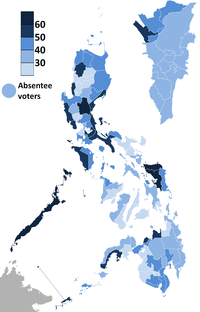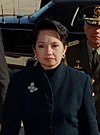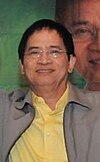Philippine presidential election, 2004
|
|
||||||||||||||||||||||||||||||||||||||||||||||||||||||||||
|
||||||||||||||||||||||||||||||||||||||||||||||||||||||||||
|
||||||||||||||||||||||||||||||||||||||||||||||||||||||||||
|
|
||||||||||||||||||||||||||||||||||||||||||||||||||||||||||
| Results per province/city: colors indicate which candidate had the highest number votes in a province/city. | ||||||||||||||||||||||||||||||||||||||||||||||||||||||||||
|
||||||||||||||||||||||||||||||||||||||||||||||||||||||||||
 |
 |
| Arroyo | Poe |
|---|---|
| Arroyo won in Western and Central Visayas, western parts of northern Luzon, northern Mindanao and in the Autonomous Region in Muslim Mindanao. Poe, on the other hand, won in Eastern Visayas, Metro Manila, southern Luzon, eastern parts of Northern Luzon and southern Mindanao. Arroyo is the first candidate to win the presidency despite losing the Lingayen-Lucena corridor. | |
The Philippine presidential and vice presidential elections of 2004 was held on Monday, May 10, 2004. In the presidential election, incumbent president Gloria Macapagal-Arroyo won a full six-year term as President, with a margin of just over one million votes over her leading opponent, highly popular movie actor Fernando Poe, Jr.. The 3.48% margin of victory is the closest margin in Philippine presidential election history.
The elections were notable for several reasons. This election first saw the implementation of the Overseas Absentee Voting Act of 2003 (see ), which enabled Filipinos in over 70 countries to vote. This is also the first election since the 1986 People Power Revolution where an incumbent President ran for re-election. Under the 1987 Constitution, an elected president cannot run for another term. However, Arroyo was not elected president, but instead succeeded ousted President Joseph Estrada, who was impeached with charges of plunder and corruption in 2000 and later convicted of plunder (but received conditional pardon from Arroyo).
Moreover, this was the first time since 1986 that both the winning president and vice president were under the same party/coalition. This election was also held at a period in modern Philippines marked by serious political polarization. This resulted in lesser candidates for the presidential and vice presidential elections compared to the 1992 and 1998 elections.
...
Wikipedia






